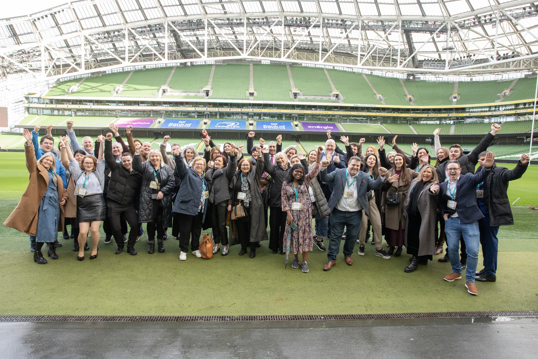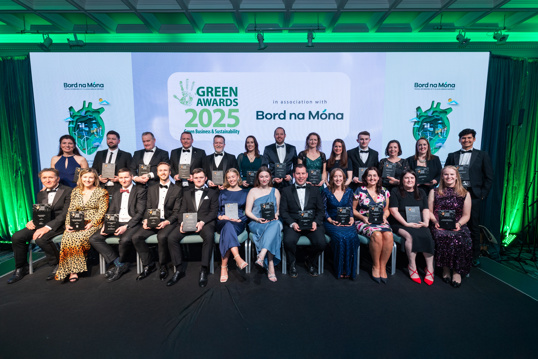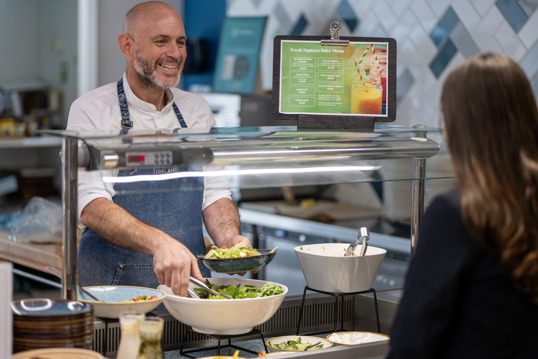Our partnership with Ross Hazel Farm
Coming from a family of vegetable growers, farming is in Lynsay Orton’s blood. She runs Ross Hazel Farm, a small holding in Clonard, Co. Meath. She has been a Compass Group Ireland supplier since 2016, growing a diverse range of fruit and vegetables used in Compass Group menus and locations around Ireland.
With a background in environmental management, Lynsay works in partnership with the Compass team to cultivate sustainable varieties of vegetables while also developing environmentally friendly methods to increase biodiversity on the farm.
She says: “I first met Compass Group through William Tallon of ReadyChef, he introduced me to them back at the end of the 2016 season. They came up here to have a look around to see and taste the produce growing. We sat down in my kitchen, had tea and flapjacks, and discussed what we could try to grow.”
“I gave them everything that summer, they liked what they saw, and that’s how it started. We put some thought into it, devised a plan as to what we might grow in 2017 and we went from there. Part of our thinking was to grow vegetables that are both unusual but also are typically imported so have high air miles. Patty pan squash was one of those suggested. We started with 8 plants in 2017 and now there are roughly 30 growing of various varieties and colours. In fact, this 2019 season there is a full tunnel of over 100 plants of various squash/zucchini varieties."
Lynsay adds: “I’m really enjoying working with Compass. We’ve developed a great working relationship and we’ve been able to see how things are working and I’ll be able to expand on ideas. Our partnership has evolved at the right pace, I don’t want to go too big too quick. Small is beautiful.”
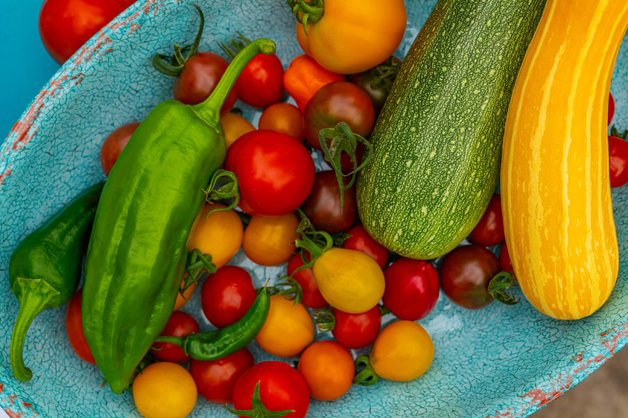
From mushrooms to cucamelons
Ross Hazel Farm started off as a mushroom farm, today the diversity of crops grown on the farm is one of the great outcomes of our partnership with Lynsay. She is never conservative in her approach to growing crops and is always happy and eager to experiment with new types of fruit and vegetable.
“I’ve always got different types of things going on, I’ve grown gherkins and mad things called cucamelons and lemon ball cucumber. I have purple aubergines, white aubergines, green aubergines. Last year I did a sample of cantaloupes, just for the craic – I just thought I’d grow a few and they worked. This year I’ve decided to grow a bit of kale as well as some peas and different kinds of beans. I tinker about.”
The idea is to trial a variety or new vegetable and depending on farm results and feedback from Compass Chefs, we develop it further the following season. Towards the end of the harvesting period, where possible, Lynsay collects and keeps seed and re-uses it the following season.
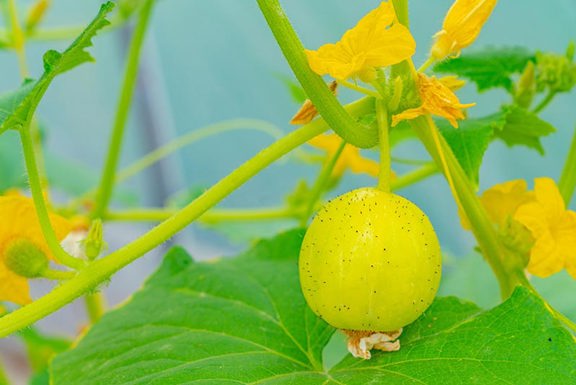
Reviving the old and unusual
Ross Hazel Farm has liaised with the Irish Seed Savers Association and other Irish seed companies to revive older and unusual vegetable seeds. Lynsay has grown 40 different tomato varieties of various colour, shape, and size. There are pink, green, purple, yellow, chocolate, and various red shades of coloured tomatoes growing. This season one single beef tomato weighed 650 grams!
Ensuring that Ross Hazel Farm can be handed down to her children is of great importance to Lynsay. Her children help her, here and there, throughout the year, watching plants grow from a tiny seed to a fruitful plant. Applying her environmental management knowledge, she has introduced farming methods which will help preserve the land for generations to come.
“Here on the farm, we are all about sustainability and green thinking. This includes the use of natural methods to combat unwanted pests and disease, homemade compost, rainwater harvesting and bees for pollination of our crops. From the start of the growing cycle, all our seedlings and herbs are planted in unwanted pots from a local gardening centre and used disposable coffee cups. We also upcycle fruit/ vegetable boxes and re-use crates from ReadyChef.”
Important contributors to production on the farm
Lynsay explains: “The bee comes along and bites the flowers to pollinate it. You’ll notice tiny little brown or orange marks on the flower, the bee has actually bitten it and has to bite it up to five times for it to actually fruit properly. This blew my mind, you can hear them loudly buzzing, they’re really going for it.That’s what their job is, that’s what they’re doing in there. I often find bees asleep in the courgette flowers because there’s just so much pollen, they’re drunk! We have had a few bee rescue missions – the tomatoes in picking boxes are so colourful that the bees confuse them for flowers…we’ve had to carefully lift out tomatoes to release bees that have been trapped.”
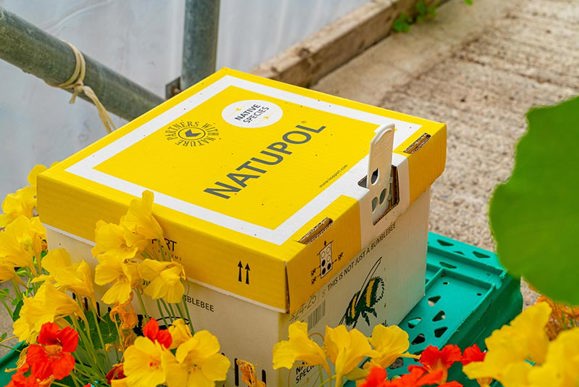
Ross Hazel Farm is pesticide-free, employing biological control, using microscopically small insects which significantly reduce the threat from common agricultural pests such as aphids and or spider mite.
Lynsay and the Ross Hazel team also harvest rainwater and make their own compost using materials provided by Compass Group, “I’ve got ground coffee beans, eggshells from one of their units, I’ve had cauliflower leaves and random different bits and I’ve put that into the compost. They then combine these ingredients with manure, chicken pellets and fish bones which is then mixed together with some peat “and basically we have rocket fuel in the crates, and we can see the results in the tunnel there.”
Sustainable and environmentally friendly
Chris Chidley, Compass Group Ireland MD says: “Our partnership with Ross Hazel Farms is very much a collaboration. Our ask of Lynsay is to plant crops that are unique, interesting and which grow well in the sustainable environmentally friendly methods she uses. She has yet to back down from that challenge and has welcomed the opportunity to work with our chefs and to grow varieties of vegetables not typically found on supermarket shelves.
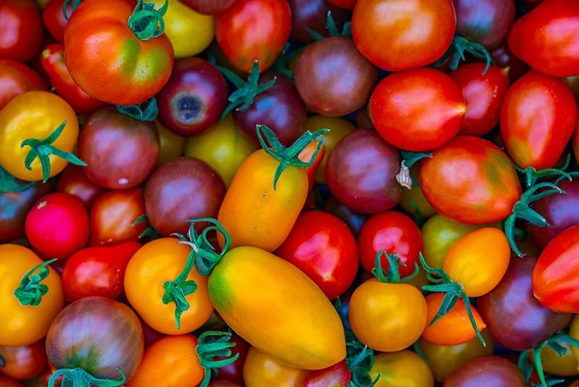
Ross Hazel is an example of how commercial production and caring for the land can go together. Sourcing produce from Lynsay’s farm rather than importing, reduces our carbon footprint, supports Irish farmers, and allows us to bring lots of new food ideas to our customers. The hard-work, innovative thinking and creative farming flair demonstrated on Ross Hazel Farm’s makes them an ideal partner for Compass Group Ireland. Together, we are confident of leading change across the industry in a shift toward environmentally conscious farming methods which are fit for the 21st century.”
Meanwhile the next generation of Ross Hazel farmers are already hard at work. “My youngest is going to be seven next week and loves to be helping out. At the moment, he’s the perfect height for picking cherry tomatoes!”

